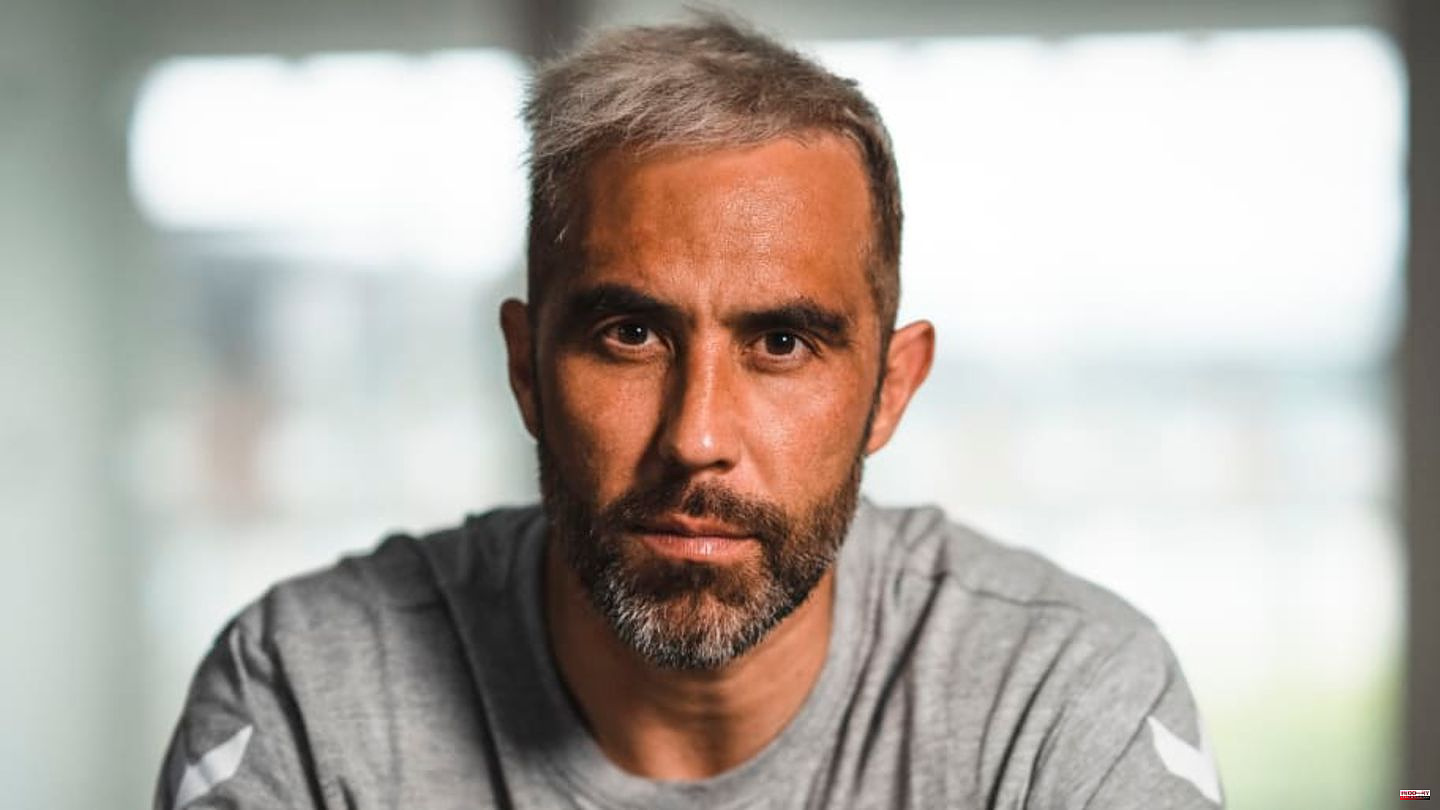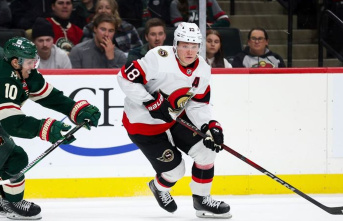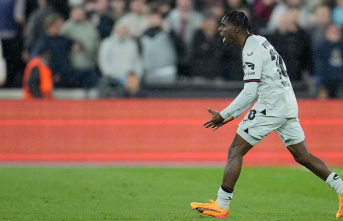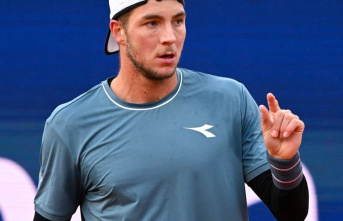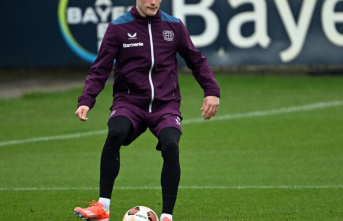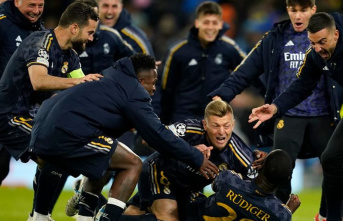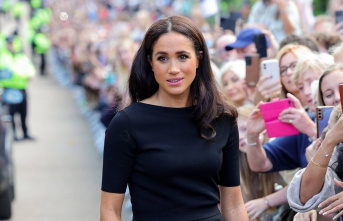To read in Spanish, click here.
1. I had a marvellous time at Manchester City.
I’m telling you, it was successful in every sense.
People say I had a tough first season, but it was a learning process. When I got to England, in 2016, the goalkeeper’s job was to smash the ball as far as possible. The lower-half teams would hit it long and go for the famous second ball.
Pep wanted me to take part in the buildup. I was going to play it short, to make myself available for the return pass. If there was no space on the left, I was going to send it to the right to restart the attack. We were trying to change the game.
There was a lot of buzz around it. Some people didn’t like it very much.
Of course, we had some problems. We also had six or seven players in the lineup who knew they’d be gone the next season, so they knew they would not be part of the long-term project. But it was always going to take time. To me, it was enriching to play in a team like that.
All four of my seasons there were amazing. I felt valued within the club. I had a great relationship with Pep. My kids learned English, and we grew a lot as a family.
The press? I never cared what they wrote. Not at all.
I guess people remember different things. When I look back at that time, I recall that I played in two League Cup finals and two Community Shields — and won them all.
2. I used to ride three hours a day in my dad’s van.
As a kid growing up in Greater Santiago — which is big — I needed an hour and a half to get to training. He’d pick me up from school and I’d climb into a back seat, where I’d sleep or eat fruit and sandwiches, so that I’d have energy when I arrived.
This was why I trained so hard. My dad was sacrificing three precious hours of his day to get me there, so the least I could do was work, you know?
I already had this dream of playing for a big team, like Barcelona. When I told my classmates, they just laughed.
My teacher looked at me as if to say, Yeah right.
But I was mentally strong. You find talent everywhere in Chile: fast strikers, magical playmakers. The difference is in the head. I was able to turn negatives into positives, to get up when others stayed down, and I realised that very quickly.
So I just decided that I was going to make it, and I wanted to repay my dad.
In a way, I still do.
3. I was nearly kicked out of Colo-Colo.
When I was 15 we were playing a youth tournament organised by a big sports brand. The winner of the regional part would play in the finals in Europe, which was watched by scouts from a lot of the major clubs. It was a huge chance for us all to get a big move.
We reached the regional final and I played in goal. I had already found out that chasing a ball was not for me. I liked the extra responsibility of saving shots, and unlike most kids, I could deal with making errors. But that day I suffered a really big one.
So it’s 0–0, last minute. They swing in a corner, and I rush out to catch the ball.
But I miss it.
They score. They win.
Now 20 super talented kids are notgoing to Europe because of me.
I felt like the biggest scapegoat in Chile. Everybody wanted me out of the club, even some of the coaches.
But there was one coach, Julio Rodríguez, who had worked a lot with me. He had taught me how to play with my feet, just like I would do at City. He was years ahead of his time. And he said, “If he goes, so do I.”
That made the club understand that it would be a mistake to throw me out. In 2003, when I was 19, I made my debut for the first team, where I played for three years. My goodbye was the second-leg final of the Apertura league season, against Universidad de Chile in 2006, when I saved two penalties in the shootout and we won the title. That would never have happened had somebody not stood up for me.
So thank you for that one, Julio.
4. I scored a goal for Real Sociedad.
We were in the second division, facing Gimnàstic at home, and we hadn’t won in three games. When we got a free kick outside the box at 0–0 just before halftime, nobody knew who would take it.
I used to stay behind with some of the players after training to take free kicks. I did it more as a joke. When I saw them shoot and miss, I’d be like, “Guys, this is how you do it.”
Sometimes I would actually score.
So when we got that free kick, Diego Rivas called me over. “Claudio! You take it.”
I said, “No, no, are you crazy??”
But he insisted. And so I left my goal and started walking across the pitch. I could feel this murmur around the stadium. “This guy is mad. What is he doing?”
That made me even more determined. I was like, If I cross the halfway line, I’m going to score. When I picked up the ball, I had this funny feeling. I had pulled this off in training. I had seen this movie before.
The whistle blows, I strike the ball and … it goes in.
Amazing. Incredible. But now comes the real problem.
What do I do?
That was the only time I’ve had no idea how to act on the pitch. You save a penalty? Great. You stop a shot? That’s normal. But scoring a goal was just … strange. Should I celebrate? Run to the corner? Do a little dance?
I just remember my teammates jumping all over me. By the time I was back in goal, I was dead. I could hardly breathe!! I was praying that I wouldn’t have another save to make.
5. Griezmann parked his car at my house.
Hahaha. He wasn’t old enough to actually drive it.
At Real Sociedad I got really close to Antoine. He was only 16 when I first met him, but you could see he had huge potential, and our mission was to help him fulfil it. I invited him to meet my family, and whenever I felt that he was veering off course, I would try to get him back on track. He was just a kid who wanted to have fun, you know? At one point he bought a car, even though he couldn’t drive it. He had nowhere to park it, so he left it outside my house.
It stood there for months. Sometimes he would come over, get into the car, turn on some music and just sit there listening. Then he’d get out and go back home. That was it.
What a player he has become. We have a great relationship, and whenever we face each other I always tell him the same thing.
“Today is not going to be your day.”
6. I felt as if Barça was made for me.
They say it’s hard for goalkeepers to play for Barça. For me it just felt natural.
You had to be a goalkeeper, playmaker and a sweeper. This was new to others, but thanks to Julio’s work at Colo-Colo I had been playing that way since I was a kid. I also felt I had the personality to handle the pressure.
When you walk out in front of 100,000 people, you recall the work that got you there: the days you were cold, the days you were hungry, the games on the concrete, the saves on the dirt fields, the hours and hours in the back of the truck … and now here you are. Green grass. Amazing teammates. I just told myself, Now enjoy it.
Which, for me, means having fun and competing at the maximum level. That will never leave me.
What came next? Eight clean sheets in a row. I had this voice in my head saying, This club was made for you. I was so confident, not even God could have scored on me. I think I’m still the last goalkeeper at Barcelona to have won the Zamora trophy for the most clean sheets in a Spanish league season.
By the way, one thing I discovered at Barça was that the top players, the very top ones — Xavi, Iniesta, Messi — are just normal people. You go there thinking they live on another planet, but they are simple guys. Then there are others who are more serious than they might seem. Take Dani Alves — it looks like he’s singing and dancing his way through life. But when it’s time to work? Dani will be the first to arrive. Dani will be the last to leave. Go to the gym and Dani will be there.
7. I never had a problem with Ter Stegen.
He played in the cups, I played in the league. The press made a big deal about it, and some even said we were enemies, but that wasn’t true at all.
We had talked about it with the coach, and I understood that they wanted to invest in the younger goalkeeper. I have never knocked on the door to ask why I’m not playing. I simply prepared the best I could and dealt with whatever came my way. I was proud to play in — and to win — La Liga, which is the bread and butter of a club like Barça.
I think Marc and I raised the bar for one another. If I don’t play, it’s my job to support the one who does, because a team is about more than 11 players. In the end we won the treble together.
That, in my eyes, made us both winners.
8. My Achilles rupture was a good thing.
At first I felt helpless, especially because it happened at the very start of my third season at City. But I got over it. I tried to visualise my road back, to fill my head with positive thoughts.
Nearly a year later, I was back. First game: Liverpool in the Community Shield.
That meant almost 80,000 people at Wembley.
I had to perform right away.
I felt good. Perhaps I would have screwed up had I not cleared my head, had I not prepared well, had I not listened to the doctors, had I not had the trust of Pep, who knew about all the work I had been putting in behind the scenes…. But all of these things had happened. So I was thinking, Why should I not do well?
The game went to penalties, and I saved a decisive one. When they took the photo of the winners, I was in it.
9. I might go into coaching.
Pep called me one day to say I’d be good at it. That meant a lot to me.
10. The Copa del Rey title was extra special.
I really wanted to win something with Betis. And my kids were able to savour it.
When I won titles in Barcelona, not all of them knew what their dad was doing. My son, Mateo, was very young, and my youngest daughter, Emma, had just been born. When we were doing the lap of honour earlier this year, in front of our amazing fans, all my kids were there, and they knew what it meant. That feeling was hard to describe. It’s like your happiness as a footballer and a dad combine and multiply.
My wife, Carla, and our four kids have always been the most emotional part of my life. Football is my job, they are the rest. San Sebastián will always be about my second daughter, Maite. My highlight from Barcelona was not a title, but the birth of Emma.
They are what makes me feel fulfilled. Take them away and everything falls apart.
We are so happy in Seville. This is my third season at Betis, and I’ll keep going as long as I feel good enough. When I no longer do, I’ll be the first one to call it a day.
11. We knew we could win the Copa América.
The loss to Brazil in the 2014 World Cup gave us a bitter taste, but we could feel that something big was coming. We had an amazing generation, players from Barça, Arsenal, Juventus.
We were under pressure, especially me as captain. We could not waste this generation. We had to win … something.
When the Copa came around in 2015, at home, it was our time.
Thankfully, we made the final against Argentina. You may have noticed that I keep coming out on top in penalty shootouts. The key is the mental part. Stats means nothing if you can’t get into the head of your opponent. You have to distract him, make him nervous, make him feel the pressure. That, basically, is how we won that final.
12. I cried when we won the second Copa.
I wasn’t supposed to go to the Centenario edition in the States. I’d just been injured, and our youngest daughter, Emma, was going through a serious medical issue.
My first two games were a disaster. I was unfit and distracted. My body was there on the pitch, but my mind was with my family back home. Our opponents were scoring goals all over the place, and I remember conceding one and thinking, No, no, no. I’m not ready to compete.
I felt so fragile. I was being killed on TV shows and social media. I was still the captain, but people were saying I had to be benched before it was too late.
At some point, I realised I just had to get it together. All my life I had been able to get back up when I had fallen down. So I began thinking about my responsibilities as captain. We had a chance to make another final. We had an amazing team that deserved to win more. I knew that if I just worked as I normally did, I’d turn the situation around. I told myself, That’s it. Enough is enough.
We won the quarterfinal and semifinal without conceding a goal. The final was against Argentina, and again it went to a shootout. I had already researched who might take their penalties. I had watched games where the stakes were similar, because when the pressure is high, players fall back on old patterns. The one I remember best is Lucas Biglia for their final one. I had watched his last eight penalties, so once I saw what kind of run-up he was making, I knew. I had already made the save.
A few minutes later, we were champions again. Two titles in two years.
As we ran around the pitch celebrating, I began to cry. As a dad, I had been thousands of miles away from my daughter. As a player, I had been the captain of the entire nation — 18 million Chileans. I had played badly. I’d been crucified. The pressure had been enormous.
Now this huge weight had fallen from my shoulders, and I just broke down.
Never forget that footballers are human beings, too.
A day later, I flew back home to my wife and my children. Emma is fine now, thank God. We celebrated by sitting down for a family dinner. Nothing special, as they say. Although for me, that was the most special thing of all.
This article was originally published on theplayertribune as 12 Things You Don’t Know About Me.

